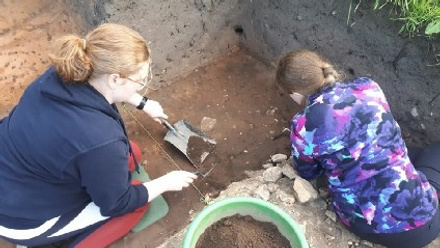The Culver Archaeological Project (CAP) involves the local community, students, trained archaeologists and volunteers in the investigation of the historic environment under the supervision of the project director, Robert Wallace, a Masters Graduate in Field Archaeology from the University of Sussex, and corporate member of the Chartered Institute for Archaeologists (CIfA).
CAP was founded in 2005 by Rob to investigate the historic landscape surrounding the Barcombe villa complex and has developed over the years to research the historical environment of the alluvial plain of the Upper Ouse Valley in the parishes of Barcombe and Ringmer.
From 2014, volunteers, students and campers have paid a modest fee for involvement, with donations received from visiting groups helping to fund the basic costs. From 2015 a fieldwork training course at the site, primarily run for Canterbury Christ Church University students, with some places available for individuals willing to pay for extra training, has provided a sound financial base for both future excavation and specialist post-excavation works. The large volunteer base created in 2013 is still very active and provides an excellent backbone to the project with the support of the yearly cohort of novice students.
We are happy to welcome volunteers with all levels of experience and ability, please do get involved! There is always plenty of work for volunteers, both in the field for those keen to dig and in finds processing. We sometimes have environmental processing work available for volunteers who want to try their hand at floatation or residue sorting. There are also limited places available on the field training school for those who wish to learn new skills, though this is subject to availability. We provide the same training as is given to the CCCU students for their undergraduate degree course.
To Register
Please fill in the below PDF's and email these to [email protected]
Under 18's
Unfortunately, we are not always able to cater for children and anyone under the age of 18 must be accompanied by a parent or guardian. Younger volunteers are welcome, but there must be suitable work available for them to complete during their visit, a situation which is changeable so please ask in advance.
What to Bring
-
4" WHS trowel
-
Sturdy footwear
-
Water bottle
-
Hat
-
Waterproof Clothing
-
Sunscreen
-
Lunch/Snacks
-
Gardening/Work gloves
All volunteers and students must have a current tetanus vaccination and should have read the Risk Assessment and Control Plan documents.
If you are planning to camp, you are required to bring your own equipment. Meals are not provided, though there is full self-catering facilities and there are pubs within longer walking distance selling hot food.
Campers are advised to be prepared for all weather conditions- the nights can be fairly cold, even in June/July. Sleeping mats are recommended and ear plugs can be beneficial for light sleepers. Don't forget to bring a torch, you will be in the country!
It is recommended that all volunteers read the site manual, To CAP it all, (see below) and will be required to read Section 3 on Health and Safety on Site before being allowed on the excavation.
Field School
The CAP field school is predominantly run for the first and second year undergraduate archaeology students of Canterbury Christchurch University. However, there are a limited number of places available for volunteers and students from other institutions who wish to improve their excavation skills, learn about different fieldwork techniques, or be trained in how to use the range of different tools and equipment often used on archaeological sites.
The fieldwork training is equivalent to that received by undergraduate students completing degree-level courses at university and is provided by a range of different specialists. The aim is to give participants a good overview of different field methods used in archaeology, whilst also engaging them in current research. During the first two weeks, participants spend most of their time learning new skills in both classroom-type sessions and during hands-on practical training exercises. The final two optional weeks are mainly spent in the field, putting these new skills into practice and working alongside volunteers, students and experienced excavators to contribute to the research project. Much of the course is based on directions given in our site manual, To CAP it all, which is available for free download from our publications page.
We cover the following techniques/skills (subject to weather conditions and availability):
-
Site health and safety
-
Excavation techniques
-
Magnetometry survey
-
Resistivity survey
-
Use of 'total station' and 'dumpy' level
-
Excavation recording
-
Plan drawing
-
Section drawing
-
Site formation
-
Environmental archaeology
-
Finds processing
-
Archaeological photography
-
Site grid set-up
-
Standing vernacular buildings
More information is available at www.culverproject.co.uk.

